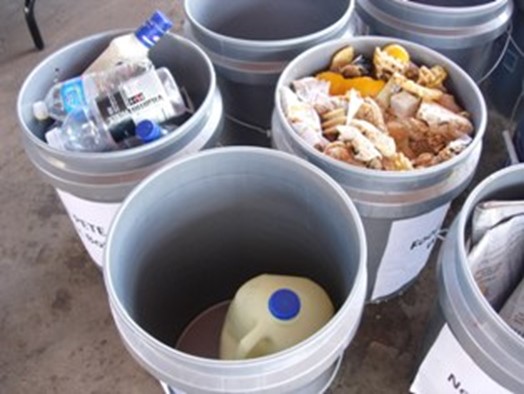THE CLIENT
Beaumont Hospital in Royal Oak, Michigan, is part of the Beaumont Health system. Beaumont Hospital is a 1,070 bed academic and referral center with level 1 trauma status serving over 58,000 admissions, over 124,000 emergency room visits, and over 1.2 million outpatient visits per year (2014 statistics). Beaumont’s three locations in Royal Oak, Troy and Grosse Pointe collective employ 14,000 full-time employees and is Oakland County’s largest employer.
THE CHALLENGE
 Today’s leading healthcare organizations increasingly recognize sustainability as an essential part of their business strategy. Americans throw away an estimated 40% of the total U.S. food supply. Hospitals are a major contributor to this waste stream, with food waste making up 10%-15% of the 6,600 tons of waste they dispose of each day.
Today’s leading healthcare organizations increasingly recognize sustainability as an essential part of their business strategy. Americans throw away an estimated 40% of the total U.S. food supply. Hospitals are a major contributor to this waste stream, with food waste making up 10%-15% of the 6,600 tons of waste they dispose of each day.
Beaumont Hospital serves 14,658 meals/day, 32% of which were patient meals, and the rest divided between the main cafeteria, smaller food service vendors, and the doctors’ dining room. Food and food related wastes are found throughout the hospital: in the kitchen cafeteria and other dining areas; break rooms and lounges; at special events; and paper towel waste from bathrooms. Beaumont, in an effort to increase their landfill diversion rates and focus on local and sustainable products and services, looked to analyze the amount of food waste passing through their system and find solutions for waste minimization and beneficial reuse.
THE SOLUTION
RRS’ work involved a baseline waste assessment to gather critical information about the facility, its food and waste management processes, foodservice products purchased, food waste volumes (pre- and post-consumer) generated, as well as collection, transportation and disposal costs. This information provided a foundation to conduct market and vendor research on all available local collection and processing opportunities. In addition, RRS investigated methods for reducing disposable take-out containers and providing options for compostable foodservice ware.
THE RESULT
RRS provided a set of prioritized best practice recommendations including food service operations, purchasing and process changes, feasible haulers and
facilities willing to take the food wastes and associated costs. This information allowed the hospital to evaluate their waste reduction goals and provided their green team with a set of next steps in their decision-making matrix.
RRS designed a phased-in program rollout for the hospital with three main elements: reduction in food and disposable serviceware; continuation of an existing food donation program; and connection to an off-site composter for processing of remaining food waste, napkins and compostable foodservice
ware. RRS and Beaumont conducted kaizens to test proposed processes and then rolled out the program in three phases, each focused on one area of the
hospital.
Phase 1: Kitchen, Patient Meals, Tray Return Line. Food prep and postconsumer waste from meal trays were collected for composting. To avoid contamination, non-compostable products were eliminated from patient meals so everything left on the trays was china, silverware, or compostable.
Food waste was also reduced through on-demand patient meals, batch cooking and appropriate portion sizes.
Phase 2: Cafeteria and Staff Lounge. Disposable products were converted to durable dishware. Instead of single serve non-compostable condiment
packets, bulk condiment dispensers were installed. “To-Go” products and premade sandwiches and salads were packaged in compostable materials and a
5% discount was given to those who used reusable dishes and silverware.
Phase 3: Other Food Service and Grab-and-Go. These operations were to be converted to utilize compostable materials and install compost collection
bins.
A final optional stage of the program would involve the addition of soiled paper such as paper towel and cardboard. While posing some challenges in
collection, the addition of these materials would help reduce odor, absorb moisture in collection containers, and allow more air to circulate.
 The total cost of the program at full rollout is a net increase of approximately $87,000 annually. This includes the continuation of over 7,000 lbs of food donation annually, the switch to reusable and compostable serviceware, bulk dispensers, compost hauling services to a local compost site, and a reduction in trash hauling and disposal charges. Additional savings not included in the projected numbers were realized through source reduction in the kitchens and food preparation areas.
The total cost of the program at full rollout is a net increase of approximately $87,000 annually. This includes the continuation of over 7,000 lbs of food donation annually, the switch to reusable and compostable serviceware, bulk dispensers, compost hauling services to a local compost site, and a reduction in trash hauling and disposal charges. Additional savings not included in the projected numbers were realized through source reduction in the kitchens and food preparation areas.
